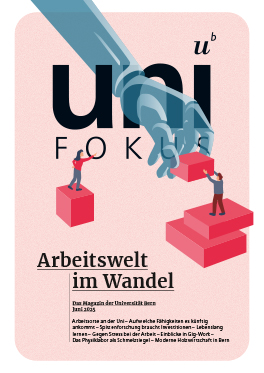Commissioned work via the web
Gig workers: This is how they really live and work
Millions of people offer their work via digital platforms. This revolution in the world of work is giving gig workers more flexibility, but also income insecurity. How are they getting along? Occupational psychologist Daniel Spurk decided to find out.

Since the gig economy emerged in the late 2010s, it has constantly been making headlines: For example, last January, when the Department of Labor and Employment in the US city of Denver summoned two companies, Instawork and Gigpro, and demanded from them one million US dollars in fines and compensation. The two platforms had placed 3,000 people in the catering and hotel industry, including (human) dishwashers, without any social security provided by the platform or the employers. The managers of the platforms argued that the people they placed were self-employed.
The gig economy, some call it the “platform economy”, became popular thanks to companies such as Airbnb (2008) and Uber (2009) and has since taken root in almost all industries. There are now hundreds of digital platforms that offer work via apps and clicks. Online platforms use algorithms to bring employees and employers together and to evaluate their performance.
Short-term jobs without commitment
The term “gig economy” is still not clearly defined and platforms often operate in a legal gray area. For Daniel Spurk, Professor of Occupational and Organizational Psychology at the University of Bern, all definitions have in common that this is a working model in which employees are not permanently employed and only enter into a short-term employment relationship. The gigs, i.e. the work, can last from a few minutes, for example during Uber trips, to several months, as in the case of specialists working on a company’s larger IT projects.
“Simple, digitally mediated access to work can also be an opportunity.”
Daniel Spurk
“It is also characteristic that the psychological contract between the employer and the employee is transactional and not relational,” says Spurk. So, in other words: Transactions tend to be more important than relationships in the gig economy. Unlike in traditional employment relationships, which are strengthened by further training opportunities and social security, identification with an employer is no longer necessary.
Teacher on a world tour

Isabelle Wyss (27)
I’ve been traveling the world for a year, but I keep coming back to Switzerland for a short time to earn money as a gig worker. This usually works immediately and I can work almost 100%. I mainly work in the service and catering sector, especially at banquets. In addition, I give private lessons and work as a substitute teacher in high school, as I used to work as a teacher. My income is usually between CHF 4,500 and CHF 5,200. I get by well with that – sometimes it’s enough to travel for several months again. I appreciate this flexibility and I love having time off on a Tuesday when others are working. Of course, there are challenges – such as hard-to-reach locations or high public transport costs. But overall, I feel that I am being treated fairly and the hedging via the platform works well. How things look long term? I’ll see. First of all, I intend to keep on traveling and enjoy my current freedom.
Gig economy growing worldwide
According to the World Bank, the gig economy accounted for around 12% of the global labor market in 2023. And Forbes has calculated that gigs in the US alone generate sales of over USD 1000 trillion per year, with an annual growth rate of 16%. As the dishwasher example shows, the gig economy has now reached all sectors, from IT and care to logistics and catering.
Magazine uniFOKUS

The changing world of work
This article first appeared in uniFOKUS, the University of Bern print magazine. Four times a year, uniFOKUS focuses on one specialist area from different points of view. Current focus topic: The changing world of work.
The “Fiverr” platform, for example, now connects companies and employees in 160 countries. The company with 800 employees and headquartered in Tel Aviv is listed on the stock exchange and generated sales of almost USD 300 million in 2021. The gigs range from designing business cards to complex programming. The Swiss platform “Coople”, on the other hand, is present only in Switzerland and the United Kingdom and, according to its own data, recruits 1.3 million gig workers. They do not primarily offer digital services, but work in the areas of health, events, office, retail, catering and logistics. “We are also seeing a clear trend toward more gig work in Switzerland,” says Spurk, “although the proportion is still significantly lower than in other countries such as Poland or the USA, where labor markets are less regulated.”
Negative image yet popular
Daniel Spurk worked intensively on the gig economy and gig workers in a four-year project run by the Swiss National Science Foundation together with colleagues from the business department of the Bern University of Applied Sciences. In doing so, the researchers combined approaches of occupational psychology and human resource management. The focus was on gig workers’ self-perception. “The gig economy has a rather negative connotation in the media and with the public, and there is a predominant perception that the employees are being exploited,” says Spurk. In fact, there have been many scandals in the past about low wages, lack of social benefits and unsafe working conditions, particularly in the Uber driving service.
Subscribe to the uniAKTUELL newsletter

Discover stories about the research at the University of Bern and the people behind it.
“But the gig economy involves much more than Uber trips,” says Spurk. “It’s impossible for millions of employees to use these platforms if the experiences were entirely negative.” He therefore wanted to find out more about why employees use these platforms and how they perceive their work with regard to the future. “In Switzerland, unlike in the USA, there is – almost no data.”
Study provides data for Switzerland
The researchers worked both qualitatively and quantitatively. They conducted interviews with 85 gig workers from Switzerland aged between 20 and 65. For example, they asked about experiences on the platforms and the perceived risks and opportunities at work. In addition to the interviews, the researchers evaluated 830 electronic questionnaires on which study participants from Switzerland, Austria and Germany with an average age of 41 years rated aspects such as control, marginalization, career satisfaction and meaningfulness on scales of 1 to 5. They all worked on platforms such as Fiverr, Coople, content.de and Upwork, with around half of the respondents working on more than one platform.
Chef with a lot of freedom

Thomas Uicker (46)
I currently work 100% via gig work platforms and live on a campsite. Income fluctuates sharply, by up to 30% from one month to the next, depending on the season and demand. In good months, I put something aside so that I can get by better in weaker phases. I often jump in on a short-term basis as a joker. As my employers then depend on good cooperation, I am usually treated correctly. The irregular working hours are normal for me as a chef. The challenge, on the other hand, is always adapting to new companies and integrating myself into existing teams. What I value most is the flexibility: I can organize my working days myself and take a lot of time for hobbies, travel and relationships. My family and friends cannot imagine such an employment relationship, but secretly admire my freedom. In the longer term, I will probably have to think about provisions for my old age and maybe I’ll look for a permanent job again.
Financial uncertainty as the main concern
The evaluation of the survey reveals a number of challenges faced by gig workers. In addition to the actual work, they have to do all the administration themselves and build up a personal brand that is valued by employers. Also questions of identity – “What do I stand for?” – can be challenging, as can uncertainties concerning the ability to plan and the course of your own career. “But the biggest strain for most of those surveyed was the financial uncertainty and the question of whether this working model is feasible in the longer term,” explains Spurk. Only 41% of respondents said they could determine their salary or fee for a gig themselves.
“Financial uncertainty and the question of long-term feasibility are a burden.”
Daniel Spurk
The gig workers, on the other hand, viewed their flexibility positively, in other words the fact that they can decide for themselves when and where they work. Stress, emotional strain and burnout tendencies were similar to studies with permanent employees. This also applied to the perceived professional development prospects and meaningfulness of the work. “On the other hand, it was striking that the general satisfaction with life of those surveyed was relatively high – even as a comparison to their satisfaction with their careers,” says Spurk. The reasons for this will now be investigated further. One possible explanation could be that gig workers place greater emphasis on flexibility and work-life balance than career. There was also a correlation between satisfaction with the placement platform used and personal satisfaction with life. “This raises the question of whether there can be something like a psychological contract between the gig workers and the platforms,” says Spurk.
Greater transparency in terms of monitoring
Based on the results, the research team has written advice on how the mediation platforms could support the psychological health of gig workers, for example with stress management programs to curb emotional exhaustion. After all, 23% of respondents stated that they suffer from a high level of stress, and 60% talked of a moderate level. According to the researchers, transparency in the monitoring of gig workers should also be increased. 70% of respondents stated that their work is evaluated via the platform. And 54% sometimes or often felt monitored by algorithms and monitoring technology. According to the researchers, the platforms could strengthen trust by establishing clear guidelines on what can be monitored and how the data is used.
Plumber, soon to be self-employed

Christian Gaud (26)
I work not only via platforms, but also on a temporary basis as an employed plumber. When it comes to platform jobs, I like the flexibility and the opportunity to gain new experience and meet new people. Best of all I like manual work that involves direct contact with people. I am currently saving for further training and am building up my own business. The combination of gig work and temporary jobs helps me to remain flexible. Sure, my income fluctuates – by around CHF 300 to 600 a month – but I can get along well with a little planning. I consciously save to avoid rough patches. What sometimes annoys me about gig work: You apply ages in advance and then you don’t get an answer for a long time. On the whole, however, I feel that I am being treated fairly, the salary is usually right and the companies behave correctly. For me, gig work is a transition; a good school for life and for my aspired independence.
A chance against unemployment
Despite the challenges, Spurk also sees opportunities in gig work from an occupational psychology perspective. Unemployment is much more risky. “It’s one of the biggest psychological risk factors of all.” Simple, digitally mediated access to work could also be an opportunity, says the professor. In addition, some people take advantage of the freedom of gig work to turn their hobbies into a profession, which in turn can have a positive effect on their mental state.
However, Spurk also points out that in this study, especially in the interviews, motivated gig workers are likely to be somewhat overrepresented. In addition, not all forms of platform work are represented. For example, no Uber drivers or employees in the catering and hotel industries were surveyed. It is therefore likely that the job satisfaction of the dishwashers in Denver is considerably lower than that of IT specialists in Switzerland.



